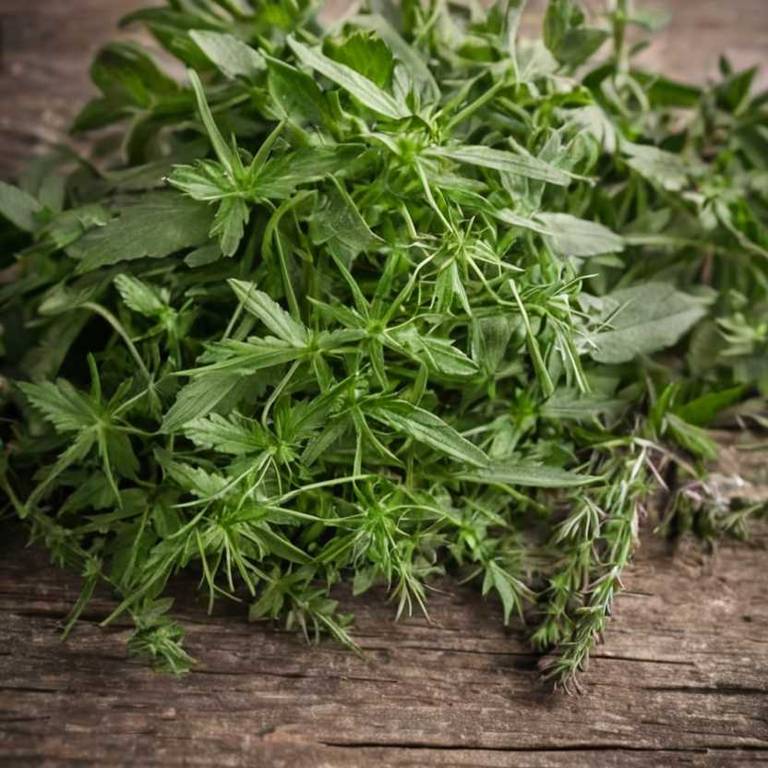10 Best Cnicus Benedictus Health Benefits

Cnicus benedictus, commonly known as blessed thistle, offers a range of health benefits due to its rich composition of bioactive compounds.
It is traditionally used to support digestive health, as it may help stimulate appetite and aid in the digestion of fats. The plant contains compounds with anti-inflammatory and antioxidant properties, which can contribute to reducing inflammation and protecting cells from oxidative stress. Additionally, blessed thistle has been studied for its potential to support liver function and detoxification processes.
However, it is important to consult a healthcare professional before using it, as it may interact with certain medications or cause side effects in some individuals.
1. Boosts immune system
Cnicus benedictus boosts immune system by containing bioactive compounds that enhance the body's natural defense mechanisms.
These compounds, including flavonoids and phenolic acids, exhibit strong antioxidant properties that protect immune cells from oxidative stress. The plant's ability to stimulate the production of white blood cells helps the body fight off infections more effectively. Additionally, Cnicus benedictus may modulate inflammatory responses, supporting a balanced immune function.
Regular consumption of this plant may contribute to overall immune health and resilience against diseases.
2. Reduces inflammation
Cnicus benedictus reduces inflammation by containing bioactive compounds that modulate inflammatory pathways in the body.
These compounds, including flavonoids and polyphenols, have been shown to inhibit the production of pro-inflammatory cytokines. This anti-inflammatory effect may help alleviate symptoms associated with conditions such as arthritis and skin disorders. Its natural properties make it a promising candidate for complementary therapeutic approaches.
Overall, Cnicus benedictus offers a potential natural solution for managing inflammation-related health issues.
3. Improves digestion
Cnicus benedictus improves digestion by supporting the healthy function of the gastrointestinal tract.
It contains compounds that may help stimulate the production of digestive enzymes, aiding in the breakdown of food and nutrient absorption. This herb is believed to alleviate common digestive issues such as bloating, gas, and indigestion. Its mild laxative properties can also help regulate bowel movements and promote regularity.
Overall, Cnicus benedictus is a natural remedy that contributes to a healthier digestive system.
4. Enhances skin health
Cnicus benedictus enhances skin health by providing essential nutrients that support the skin's natural regeneration process.
Its rich content of antioxidants helps neutralize free radicals, which can damage skin cells and accelerate the aging process. This plant also promotes hydration and elasticity, leading to a more supple and radiant complexion. Additionally, it may help in reducing inflammation and redness, making it beneficial for those with sensitive or acne-prone skin.
Overall, Cnicus benedictus contributes to a healthier, more resilient skin structure through its nourishing and protective properties.
5. Supports heart health
Cnicus benedictus supports heart health by promoting cardiovascular function through its rich content of bioactive compounds.
These compounds, including flavonoids and polyphenols, help reduce oxidative stress and inflammation, which are key factors in the development of heart disease. The plant's ability to improve blood circulation and lower blood pressure further contributes to its cardioprotective effects. Additionally, it may help regulate cholesterol levels, reducing the risk of atherosclerosis.
Regular consumption of Cnicus benedictus may therefore serve as a natural complement to a heart-healthy lifestyle.
6. Aids in detoxification
Cnicus benedictus aids in detoxification by supporting the body's natural processes to eliminate harmful toxins.
It contains bioactive compounds that enhance liver function, which is crucial for filtering toxins from the bloodstream. This herb also promotes the production of enzymes that assist in breaking down and removing harmful substances from the body. Its antioxidant properties help neutralize free radicals, further supporting the detoxification process.
Regular use of Cnicus benedictus may contribute to improved overall health and a more efficient detox system.
7. Promotes mental clarity
Cnicus benedictus promotes mental clarity by supporting cognitive function and reducing mental fatigue.
This herb is believed to enhance focus and concentration, making it beneficial for individuals seeking improved mental performance. Its traditional use in herbal medicine suggests that it may help in clearing mental fog and improving overall mental sharpness. The active compounds in Cnicus benedictus may interact with the nervous system to support brain health.
As a result, it is often used as a natural aid for those looking to maintain or enhance their mental acuity.
8. Improves circulation
Cnicus benedictus improves circulation by promoting the dilation of blood vessels, which enhances blood flow throughout the body.
This herb contains bioactive compounds that support cardiovascular health and reduce the risk of circulatory disorders. Its natural properties help in lowering blood pressure and preventing the formation of blood clots. Regular use of Cnicus benedictus may aid in alleviating symptoms related to poor circulation, such as swelling and fatigue.
Overall, it serves as a valuable supplement for maintaining healthy blood flow and supporting the circulatory system.
9. Strengthens hair growth
Cnicus benedictus strengthens hair growth by promoting the health of hair follicles and improving scalp conditions.
This plant contains bioactive compounds that stimulate the production of keratin, a key protein in hair structure. Its anti-inflammatory and antioxidant properties help reduce scalp irritation and oxidative stress, which can hinder hair growth. Regular use of Cnicus benedictus-based products may lead to stronger, thicker, and more resilient hair.
Overall, it supports a healthier hair growth cycle, making it a valuable natural remedy for those seeking to enhance their hair's vitality.
10. Reduces stress levels
Cnicus benedictus reduces stress levels by interacting with the body's neurochemical systems to promote a calming effect.
This plant contains bioactive compounds that may influence neurotransmitter activity, such as serotonin and GABA, which are known to regulate mood and anxiety. Studies suggest that regular consumption of Cnicus benedictus may help lower cortisol levels, a hormone associated with stress. Its adaptogenic properties allow it to support the body's ability to cope with stress more effectively.
As a result, it is increasingly being explored as a natural remedy for stress management in holistic health practices.